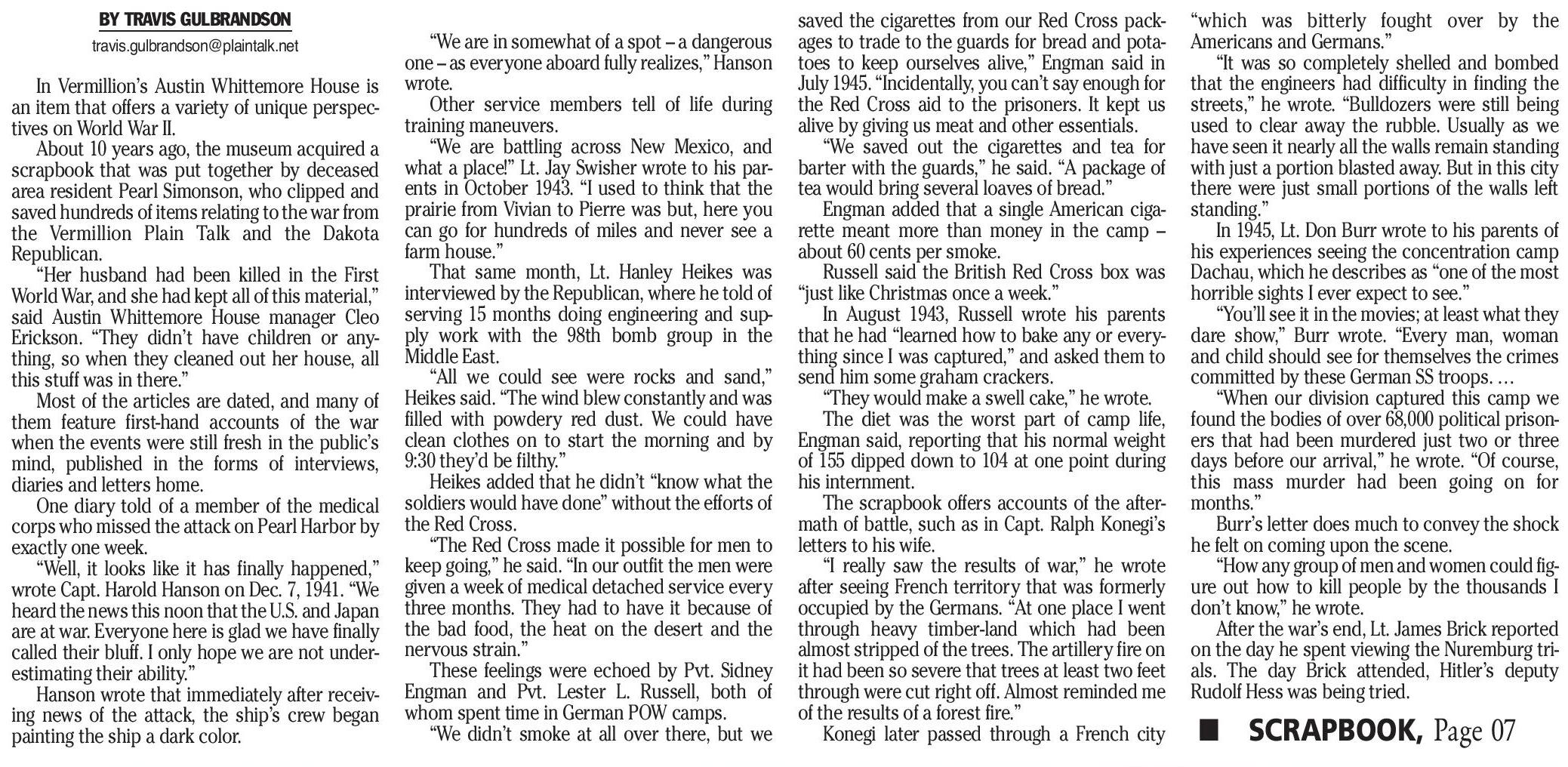5


Heritage 2012: Military 05
November 9, 2012 www.plaintalk.net
Special scrapbook offers unique points of view during war years
BY TRAVIS GULBRANDSON
travis.gulbrandson@plaintalk.net
In Vermillion’s Austin Whittemore House is
an item that offers a variety of unique perspectives on World War II.
About 10 years ago, the museum acquired a
scrapbook that was put together by deceased
area resident Pearl Simonson, who clipped and
saved hundreds of items relating to the war from
the Vermillion Plain Talk and the Dakota
Republican.
“Her husband had been killed in the First
World War, and she had kept all of this material,”
said Austin Whittemore House manager Cleo
Erickson. “They didn’t have children or anything, so when they cleaned out her house, all
this stuff was in there.”
Most of the articles are dated, and many of
them feature first-hand accounts of the war
when the events were still fresh in the public’s
mind, published in the forms of interviews,
diaries and letters home.
One diary told of a member of the medical
corps who missed the attack on Pearl Harbor by
exactly one week.
“Well, it looks like it has finally happened,”
wrote Capt. Harold Hanson on Dec. 7, 1941. “We
heard the news this noon that the U.S. and Japan
are at war. Everyone here is glad we have finally
called their bluff. I only hope we are not underestimating their ability.”
Hanson wrote that immediately after receiving news of the attack, the ship’s crew began
painting the ship a dark color.
“We are in somewhat of a spot – a dangerous
one – as everyone aboard fully realizes,” Hanson
wrote.
Other service members tell of life during
training maneuvers.
“We are battling across New Mexico, and
what a place!” Lt. Jay Swisher wrote to his parents in October 1943. “I used to think that the
prairie from Vivian to Pierre was but, here you
can go for hundreds of miles and never see a
farm house.”
That same month, Lt. Hanley Heikes was
interviewed by the Republican, where he told of
serving 15 months doing engineering and supply work with the 98th bomb group in the
Middle East.
“All we could see were rocks and sand,”
Heikes said. “The wind blew constantly and was
filled with powdery red dust. We could have
clean clothes on to start the morning and by
9:30 they’d be filthy.”
Heikes added that he didn’t “know what the
soldiers would have done” without the efforts of
the Red Cross.
“The Red Cross made it possible for men to
keep going,” he said. “In our outfit the men were
given a week of medical detached service every
three months. They had to have it because of
the bad food, the heat on the desert and the
nervous strain.”
These feelings were echoed by Pvt. Sidney
Engman and Pvt. Lester L. Russell, both of
whom spent time in German POW camps.
“We didn’t smoke at all over there, but we
saved the cigarettes from our Red Cross packages to trade to the guards for bread and potatoes to keep ourselves alive,” Engman said in
July 1945. “Incidentally, you can’t say enough for
the Red Cross aid to the prisoners. It kept us
alive by giving us meat and other essentials.
“We saved out the cigarettes and tea for
barter with the guards,” he said. “A package of
tea would bring several loaves of bread.”
Engman added that a single American cigarette meant more than money in the camp –
about 60 cents per smoke.
Russell said the British Red Cross box was
“just like Christmas once a week.”
In August 1943, Russell wrote his parents
that he had “learned how to bake any or everything since I was captured,” and asked them to
send him some graham crackers.
“They would make a swell cake,” he wrote.
The diet was the worst part of camp life,
Engman said, reporting that his normal weight
of 155 dipped down to 104 at one point during
his internment.
The scrapbook offers accounts of the aftermath of battle, such as in Capt. Ralph Konegi’s
letters to his wife.
“I really saw the results of war,” he wrote
after seeing French territory that was formerly
occupied by the Germans. “At one place I went
through heavy timber-land which had been
almost stripped of the trees. The artillery fire on
it had been so severe that trees at least two feet
through were cut right off. Almost reminded me
of the results of a forest fire.”
Konegi later passed through a French city
“which was bitterly fought over by the
Americans and Germans.”
“It was so completely shelled and bombed
that the engineers had difficulty in finding the
streets,” he wrote. “Bulldozers were still being
used to clear away the rubble. Usually as we
have seen it nearly all the walls remain standing
with just a portion blasted away. But in this city
there were just small portions of the walls left
standing.”
In 1945, Lt. Don Burr wrote to his parents of
his experiences seeing the concentration camp
Dachau, which he describes as “one of the most
horrible sights I ever expect to see.”
“You’ll see it in the movies; at least what they
dare show,” Burr wrote. “Every man, woman
and child should see for themselves the crimes
committed by these German SS troops. …
“When our division captured this camp we
found the bodies of over 68,000 political prisoners that had been murdered just two or three
days before our arrival,” he wrote. “Of course,
this mass murder had been going on for
months.”
Burr’s letter does much to convey the shock
he felt on coming upon the scene.
“How any group of men and women could figure out how to kill people by the thousands I
don’t know,” he wrote.
After the war’s end, Lt. James Brick reported
on the day he spent viewing the Nuremburg trials. The day Brick attended, Hitler’s deputy
Rudolf Hess was being tried.
? SCRAPBOOK, Page 07
The management and staff at the Plain T
alk
and Broadcaster would like to recognize and
honor our publisher, Gary Wood, for his service
to our country, and all who have served our
country, past and present. God bless you all.
Broadcaster Press
Gary Wood
US Army 1977-1985, Staff Sergeant
Served in Central America, Alaska and
other locations throughout the United States.















 Previous Page
Previous Page






